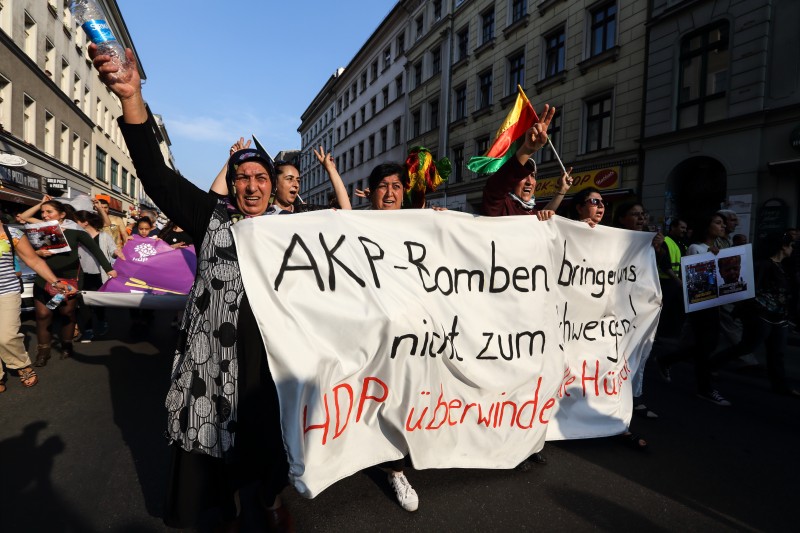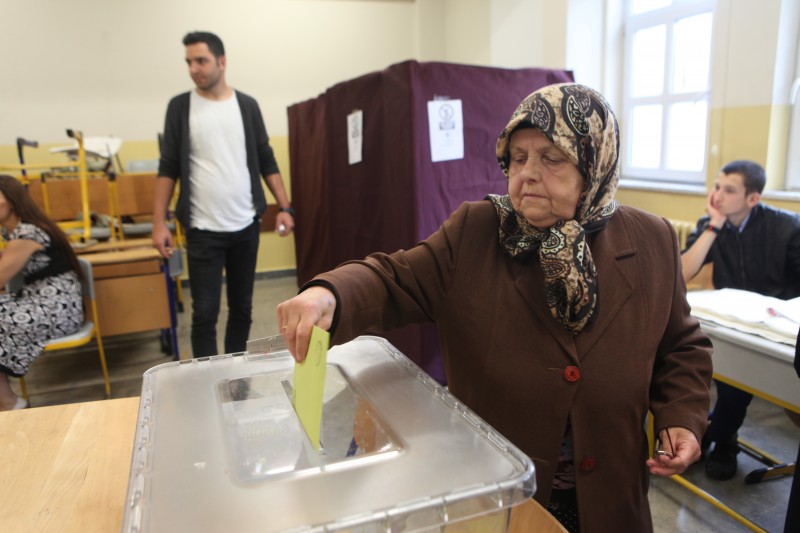
Kurds march in Berlin against violence in Turkey's election campaign on June 6, 2015. Photo by Thorsten Strasas. Demotix ID: 7791816.
The following post covers Turkey's June 7 general election. Ece Basay [1], Erkan Saka [2], Efe Levent [3], Ahmet Sabanaci [4] and Chris Rickleton contributed updates to this post.
With votes fully counted in a high-stakes general election in Turkey, long-dominant conservative AKP (Justice and Development Party) fell short of a majority in the parliament thanks to the emergence of the pro-Kurdish HDP (People's Democratic Party).
Results left the AKP with around 41% of the vote and unable to form a single party government. HDP, with around 13% of the vote, comfortably crossed the 10% threshold required for parliamentary representation, while the CHP Republican People's Party (25%) and the MHP nationalists (16.3%) also entered the parliament.
It did not take long before Turkish tweeps were calling both the results and an unprecedented uptick in citizen monitoring initiatives a victory for the 2013 Gezi park protests that the AKP government quelled with excessive force:
My take, too. The election monitoring initiative, the pro-Kurdish sentiment, diverse candidates all legacy of Gezi. https://t.co/oBze1mA27z [5]
— Zeynep Tufekci (@zeynep) June 7, 2015 [6]
While Selahattin Demirtaş, HDP's leader, who ruled out forming a coalition with AKP, dedicated his party's success to both the youth of the Gezi movement, and the Turkish-Syrian border town of Kobane, which overcame [7] the brutal ISIS radical group after over 133 days of intense fighting.
Demirtaş : Bu zafer Gezi'nin ve Kobane'nin kol kola yürüyen gün yüzlü gençlerin bize armağanıdır.
— İzmirliHDPli (@HDPlizmirli) June 7, 2015 [8]
This victory is a present of the smiling and shining youth of Gezi and Kobane
Voters also thanked the party's women's organisation for “changing the language” of politics in Turkey:
Siyasetin dilini, yapısını değiştiren @HDPkadin [9] larına çok özel teşekkürler! Sessiz sedasız yürüttüğünüz devrim her yere bulaşsın :)
— Ayşe Gül Altınay (@aysealtinay) June 7, 2015 [10]
We specifically thank to @HDPKadin who have changed the language and the structure of politics. Let this silent revolution which you have been leading spread everywhere.
According to the constitution, a potential coalition government should be formed in 45 days. If that is not possible, fresh elections will be called. Analytical website JamesinTurkey.com looked at potential coalitions [11] prior to the vote going ahead.

Voting in Turkey's crucial General Election commences in Istanbul on June 7, 2015. Photo by SADIK GÜLEÇ. Demotix ID 7795364.
This video produced before the elections by the Taiwan-based TOMO news agency, which covers world events in short animated clips, shows how good news for HDP was bad news for President Recep Tayyip Erdoğan's bid to shift constitutional powers from the parliament to the president.
Violations
Given the tight margins involved in the vote, it is perhaps not surprising that users following the elections using open source mapping [12] documented a number of violations.
Citizen media group Dokuz8Haber [13], working with the Seçim Var project that crowdsourced reports from all over the country on election day, noted:
#Secim2015 [14] #Sandıktayım [15] #ENG [16] pic.twitter.com/puNU3BGd2V [17]
— dokuz8 (@dokuz8haber) June 7, 2015 [18]
Birgun, a live blog [19] (in Turkish) also kept pace with violations. One key electoral controversy — as predicted in the TOMO video — was electricity failures. Power cuts hit polling stations in Urfa, a mainly Kurdish region where support for the HDP is strong and, more briefly, the Tesvikiye region of Istanbul.
Global Voices contributor Arzu Geybullayeva noted:
There are electricity cuts in tesvikiye. It's been 30min or so. #OyunaSahipCık [20] #Periscope [21] #Secim2015 [14] is it a coincidence? — Arzu Geybulla (@arzugeybulla) June 7, 2015 [22]
Another seeming irregularity widely shared on social media was the appearance outside polling stations of cars with no number plates:
Mystery of cars without licence plates around polling stations. Authorities should explain… #TurkeyElections [23] https://t.co/AdMVLAQcQX [24] — Erkan Saka (@sakaerka) June 7, 2015 [25]
Some citizens responded to the appearance of the vehicles — assumed to be linked in some way to ballot fraud — by blasting their tires:
Türkiye'nin her yerinde plakasız araçların lastikleri patlatılmaya başladı. Efsane bir seçim… #lastikleripatlat [26] — Volkan Bozaci (@Volkances) June 7, 2015 [27]
People have started to blast the tires of the cars without the licence plates. A legendary election #blastthetires
Regional party becomes national and international focus
In the run-up to the vote, HDP offices and rallies were subjected [28] to attacks by unknown assailants.
On June 5, in the key Kurdish majority city of Diyarbakir, a party rally suffered [29] a devestating bomb attack that killed two and injured hundreds, triggering anti-government protests among the country's Kurdish minority in the country's east and abroad.
The AKP publicly condemned the attacks, while President Erdoğan called the bomb blast a “provocation”.
As their votes promised to swing the election, the minority was the subject of much international attention:
130 year old Kurdish man voting . Arnt you ashamed Pakistanis for not standing for your rights #TurkeyElections [23] pic.twitter.com/IpaagqGB7h [30] — Maan Imran Khan (@MaanImranKhan) June 7, 2015 [31]
Wounded at the twin explosions at #HDP [32]‘s #Diyarbakir [33] rally, that's determination. #bbcturkey15 [34] pic.twitter.com/eEg1ErNATa [35] — Zeynep Erdim (@zeynep_erdim) June 7, 2015 [36]
In a far cry from scenes earlier in the week, HDP supporters in Diyarbakir were in a celebratory mood as preliminary results filtered in, ignoring the pleas of co-leader Selahattin Demirtas not to go wild before final totals were known:
Celebrations in Diyarbakir in front of HDP hq. #Turkeyvotes2015 [37] pic.twitter.com/9orkvuteQD [38]
— Humeyra Pamuk (@humeyra_pamuk) June 7, 2015 [39]
The AKP-formed government is credited by many with delivering long-run economic growth in the post-millennial era. But the party's perceived arrogance and authoritarian streak, embodied in Erdoğan's political persona, appear to have alienated large swathes of the electorate.
Media freedom concerns
After the 2013 Gezi protests [40], the Turkish mainstream media earned themselves the moniker “penguin [40] media [41]” because of their pro-government messaging and skewed portrayal of the protesters.
In 2014, Freedom House explained [42] its decision to change the country's press freedom ranking from free to unfree:
Turkey’s status declined from Partly Free to Not Free as a result of a sharp deterioration in the press freedom environment in 2013. Journalists were harassed and assaulted while attempting to cover the Gezi Park protests that broke out in Istanbul in May, and dozens were fired or forced to resign in response to their reporting on the demonstrations. Throughout the year, other prominent journalists were fired over their coverage of sensitive issues like negotiations between the government and the separatist Kurdistan Workers’ Party (PKK) or corruption scandals involving Prime Minister Recep Tayyip Erdoğan and his associates that emerged in December. The firings highlighted the close relationship between the government and many media owners, and the formal and informal pressure that this places on journalists.
Build, build build
Turkey's economic growth from the early years of the AKP era was accompanied by a construction boom that has continued apace even as the economy has slowed down, fuelling fears for the environment and the long-term future of the country's uniquely diverse cultural heritage.
For Global Voices posts on the boom see:
Can Istanbul be Saved from Overdevelopment? [43]
Gezi's Echo and the Battle for Public Spaces in Turkey [44]
Watch John Lubbock's ‘Istanbul: the Politics of Architecture [45]‘
Gender inequality and violence
According to data from the Ministry of Justice, the rate of murders of women increased 1400% between 2002 until 2009, and there have been further increases since. While it is difficult to hold AKP directly accountable for the shocking uptick in gender violence during its rule, many Turkish feminists feel that a patriarchal party narrative and President Recep Tayyip Erdoğan's views on the impossibility of equality between the sexes have not helped matters.
Turkish women's representation in the workforce remains just over half the EU average and there has been little progress on this front in the last five years.
For Global Voices posts on gender-based violence and inequality in Turkey see:
As Turkish Women Struggle for Freedom from Violence, Their President Tells Them: Give up on Equality [47]
‘You Will Do Anything for Ratings': More Outrage over the Wife Killer ‘Star’ of Turkish Daytime TV [48]
Turkey Mourns a Female Student's Brutal Death [49]
What Does Turkey's General Election Promise for Women? [50]
Online tools’ contribution to the election
Global Voices author Erkan Saka has been tracking a number of online tools that have helped citizens follow and understand the electoral process better.
Covering Turkey's General Elections, One Tool at a Time [12]
Data Set Demonstrates Attacks on Turkish Opposition Party's Campaign Offices Are Systematic [28]
Ahead of Turkey's Critical General Election, a Fact-Checking Website Analyses Political Statements [51]